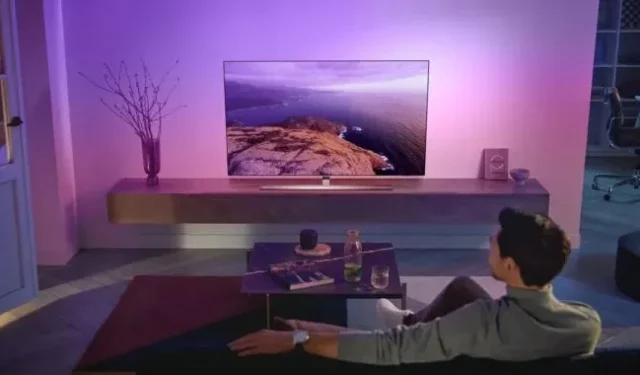Philips has unveiled the first TVs to use LG’s new type of OLED panel, OLED EX. The Philips OLED807 4K HDR TV range announced on Thursday is unpriced, but it will be released in Europe this year.
OLED EX promises to increase brightness “up to 30 percent over conventional OLED displays,”according to LG. Despite their famous high contrast ratio, OLED panels generally don’t reach LED panel brightness levels that can exceed 1400 nits. Unfortunately, Philips hasn’t provided specific brightness specifications for the OLED807, other than repeating the “30 percent brighter”claim.
The OLED807 diodes use deuterium compounds, which LG says are brighter and more efficient than hydrogen. OLED EX panels combine this material with machine learning to manage “the power consumption of TVs to more accurately display the details and colors of the video content being played,”LG said when announcing OLED EX.
Philips will offer the OLED EX panel in four sizes: 48″, 55″, 65″and 77″. The sets support HDMI 2.1 with variable refresh rates from 48 to 120 Hz and all possible HDR options.
LG also promised smaller bezels with the OLED EX, and the OLED807’s bezels are hard to spot – at least in the images the company has shared. LG says bezel thickness will drop from 6mm to 4mm on 65-inch panels.
The ad attributed the thin bezels to an “external metal frame that provides a seamless connection”to the updated Ambilight System, a Philips TV feature that places reactive LEDs at the edges of the TV.
LG does not claim that OLED EX will significantly reduce the risk of burn-in, but Philips says that the OLED807 will combat this problem by using “logo detection to monitor the zone grid to accurately detect static content and gradually reduce the intensity of its local image.”light output,” the announcement said this week.
In addition, the OLED807 based on Android TV 11 is positioned as suitable for gamers. In addition to 120Hz, the highest refresh rate supported in 4K by the latest Xbox and PlayStation consoles, the set promises HDMI 2.1 with a full bandwidth of 48Gbps. There’s also Nvidia G-Sync and AMD FreeSync Premium compatibility to combat screen tearing.
In addition, Philips is introducing a “game bar”to provide “quick access to picture and sound settings”, including Adaptive-Sync. The package also includes a new 70W 2.1 sound system featuring four passive radiators and a rear-facing woofer.
Improved AI
Philips says future TVs will update the OLED806 P5 AI processor; improvements include the ability to adjust brightness, color, and gamma based on ambient light for SDR and HDR content. You can switch between Dark Details, Color Temperature Optimization, or Eye Care settings. There are also five new intelligent picture modes (instead of two) in the AI Auto Film Mode feature.
Philips has stated that its OLED EX TVs will only be released in Europe. We expect to hear more OLED EX TV announcements from LG partners as well as from LG itself, which will move all OLED TV production in Paju, South Korea, and Guangzhou, China to OLED by the second quarter of the year.


